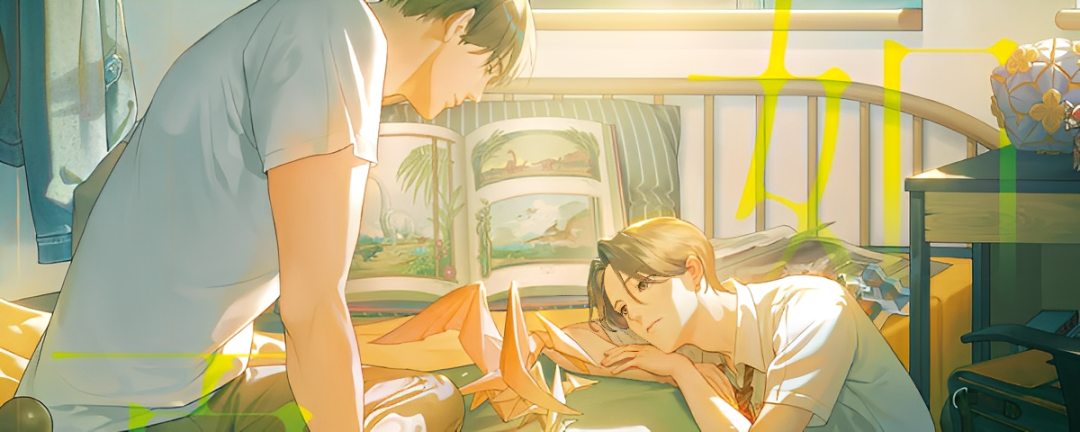BOSF 002: Self-Righteous Empathy
by cloudiesThe bell signaling the end of the second period rang, and Ji Yan stepped out of Class 2’s classroom, heading to the restroom at the far end of the corridor.
The first-year classrooms were on the second floor, with four classes along one corridor. For new students, classes weren’t divided by academic performance but mixed randomly. Ji Yan had been assigned to Class 2. As he passed Class 3 and approached Class 4, he suddenly heard laughter and commotion coming from Class 4’s classroom. Drawn by the noise, he glanced inside and saw Xiang Yang sitting in the last row by the window, surrounded by a few male classmates. They were talking to him with mocking grins, as if teasing him. Xiang Yang, however, kept his head down, staring at the desk, motionless, expressionless, neither flustered nor anxious, almost as if no one else existed.
—People with autism typically show little interest in others, struggle to understand others’ emotions, and often fail to notice when someone is speaking to them, whether with malicious mockery or kind concern.
Ji Yan stopped in his tracks, watching the scene through the window.
The boys weren’t physically harming Xiang Yang; they were just amusing themselves by mocking and teasing him. This small rural town was so insular that there was only one school nearby. News of affairs, deaths, or cheating scandals spread quickly through the streets. Xiang Yang was well-known here, but for all the wrong reasons. From the moment he was diagnosed with autism, from the moment he displayed reactions different from those around him, he became fodder for gossip, often discussed with tones of pity and sympathy. This was why his parents frequently argued and feared him wandering outside, causing embarrassment. They felt it brought shame to their family.
A child reflects their parents’ pride. When a child excels or scores well on exams, parents feel proud. Conversely, a child like Xiang Yang was often seen as a family misfortune, even a burden.
Ji Yan suddenly recalled the scene from that morning as he was leaving for school. While putting on his cloth shoes at the entrance, he heard the door across the hall open through the wooden and iron doors separating their apartments. First came the click-clack of high heels, followed by Xiang Yang’s mother’s hushed urging, as if afraid of being noticed: “Hurry up, move faster…”
Her words were clearly directed at Xiang Yang behind her.
Ji Yan paused, hand on the doorknob, waiting patiently for them to leave first. It wasn’t that he didn’t want to greet them, but his mother had specifically instructed him that Xiang Yang’s mother would feel awkward, so it was better to avoid encountering them.
Xiang Yang’s mother must have been a beauty in her youth, owning several pairs of high heels. The sound of heels clicking on the ground always drew attention. Yet now, this middle-aged woman, still maintaining her makeup when going out, acted like a thief, sneaking Xiang Yang to school to avoid embarrassment. After all, no junior high student needed their mother to escort them to school unless they lacked the ability to go alone. Xiang Yang’s parents, unwilling to send him to a special school yet insisting on treating him as “normal,” had to endure this hardship. Perhaps they thought once he completed nine years of compulsory education, he wouldn’t need to attend school anymore or go out and “embarrass” them.
But that would be Xiang Yang’s entire life.
That morning, Ji Yan had checked the time—it was exactly 7:00 a.m. If he hadn’t been on duty to clean the classroom early, he wouldn’t have left so soon and wouldn’t have witnessed this scene.
Ji Yan stood at the entrance for a full ten minutes, waiting for the mother and son to leave.
During that time, he wondered: Did Xiang Yang’s parents love him? He used to think they didn’t, given how indifferent they seemed, often scolding him and showing no interest in getting him special education. But if they didn’t care, why would his mother, year after year, escort him to school to ensure he didn’t get lost?
From a young age, Ji Yan knew parental love was a contradictory thing—caring yet selfish.
“Hey, classmate, you heading to the restroom?”
A voice from behind snapped Ji Yan back to reality. He realized he was standing in the middle of the corridor, blocking the way. He apologized and stepped aside, then glanced back at Class 4’s classroom.
The boys were still lingering around Xiang Yang’s seat, not doing anything extreme but with mocking expressions that were hard to stomach.
Ji Yan clenched his fist, watching but lacking the courage to enter the classroom and stop them. What reason could he give? That he was Xiang Yang’s neighbor? But he wasn’t even in their class.
He was an ordinary person, not particularly brave. The faint sense of justice in his heart was easily quelled by fear. His focus on Xiang Yang, beyond their proximity as neighbors, might stem from confronting the harsh realities of the world just as his own values were forming. But in truth, he had no real connection with Xiang Yang, who likely didn’t even recognize him.
Ji Yan tried to convince himself to mind his own business, though his heart still wrestled with the thought.
At that moment, a female classmate approached the group and said a few words, seemingly telling them to stop bullying Xiang Yang. Ji Yan was too far to hear clearly, but the boys scattered shortly after.
Ji Yan let out a sigh of relief and hurried to the restroom before the bell for the next class rang. After coming out, he couldn’t help but glance into Class 4 again.
Xiang Yang was still at his seat, head down, staring at the desk, as if the earlier events had nothing to do with him.
Watching Xiang Yang’s calm, serene expression, Ji Yan suddenly had an odd thought: maybe Xiang Yang was the truly strong one. Wasn’t he? Indifferent to his surroundings, unaffected by others’ mockery or malice. It was ironic yet profoundly true.
People like Xiang Yang, living in their own inner worlds, couldn’t be hurt by anyone—not even their parents.
What we perceive as “abnormal” merely reflects our own fragility. We fear being treated that way, fear embarrassment, and so we project those feelings onto Xiang Yang, cloaking it in self-righteous sympathy and empathy.
But for Xiang Yang, perhaps these concerns were entirely meaningless.


0 Comments